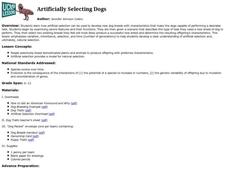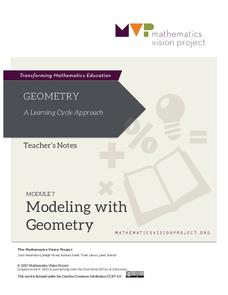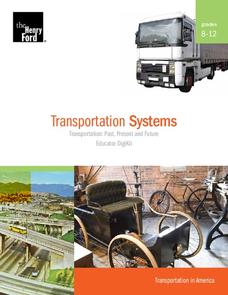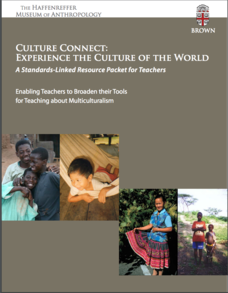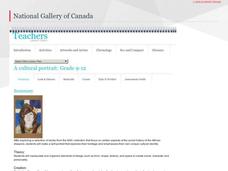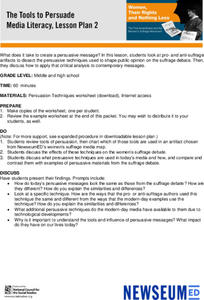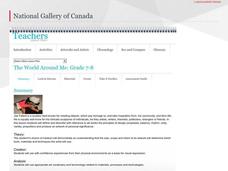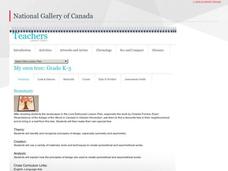EngageNY
General Pyramids and Cones and Their Cross-Sections
Are pyramids and cones similar in definition to prisms and cylinders? By examining the definitions, pupils determine that pyramids and cones are subsets of general cones. Working in groups, they continue to investigate the relationships...
Teaching Tolerance
Using Photographs to Teach Social Justice | Supporting Social Border Crossings
A lunch-time activity encourages pupils to step out of their usual lunch bunch and connect with someone new. To begin, individuals examine a group photograph and identify what they believe is the gender, race, religion, and sexual...
Curated OER
Lesson: Unfolding Water Lilies
Comparing two different artistic mediums can be a welcome challenge. Learners compare Monet's The Water Lily Pond to three nature-inspired poems. They consider how each art form is interrelated, descriptive, and expressive. They then...
National WWII Museum
On Leave in Paris: Maps as Primary Sources
Primary sources—even those that seem mundane—offer a window into those who experienced history. Using a Red Cross map offered to soldiers stationed in Paris after World War II alongside worksheet questions, scholars consider what life...
Curated OER
Pedro Menéndez de Avilés
Partners examine the family tree of Pedro Menéndez de Avilés, a Spanish admiral and explorer who founded St. Augustine, Florida, and answer several questions about the text using a worksheet. After they've explored the family tree,...
National History Day
Heroes Who Made a Difference: Memorializing a Distinguished Service Cross Award Recipient
Ever wonder how to memorialize World War I heroes in the classroom? Activities in a high-quality social studies resource prompt middle schoolers to research Internet sources, complete a graphic organizer, and write an editorial feature...
The New York Times
Crossing the Line Online: Sexual Harassment and Violence in the Age of Social Media - NYTimes.com
Sexual harassment and sexual violence are by no means new issues. What has changed is the role of social media in these issues. This powerful and troubling lesson uses a specific rape case to launch research into a discussion of the...
Environmental Protection Agency (EPA)
The Case of the Mysterious Renters
Upper-elementary kids examine the water usage in their own home, then use that data to solve a case in which a landlady is trying to determine how many people are living in an apartment being rented. Combine math, scientific method, and...
University of California
Artificially Selecting Dogs
Selective breeding has resulted in some novel and beautiful or useful dogs over the years. Using the American Foxhound as an example, genetics learners find out how and why they came about. Then, in small groups, they select breeds to...
Mathematics Vision Project
Module 7: Modeling with Geometry
Model good modeling practices. Young mathematicians first learn about cross sections and solids of revolution. They then turn their attention to special right triangles and to the Laws of Sine and Cosine.
Henry Ford Museum
Transportation Systems
Learners analyze the evolution of cultural attitudes through the lens of transportation, examining several artifacts, documents, and photographs. Topics covered include how American attitudes have influenced society's evolution into a...
Brown University
Culture Connect: Experience the Culture of the World
A rich series of activities introduces learners to the concept of culture by closely examining the behaviors, practices, and art of three distinct peoples: the Highland Maya of Guatemala, the Hmong of China and Southeast...
EngageNY
The Volume of Prisms and Cylinders and Cavalieri’s Principle
Young mathematicians examine area of different figures with the same cross-sectional lengths and work up to volumes of 3D figures with the same cross-sectional areas. The instruction and the exercises stress that the two...
National Gallery of Canada
Contemporary Reflections
Combine art and writing in a lesson about legends. After viewing Inuit art, class members examine their own cultural surroundings in order to write and visually represent a legend. Individuals are invited to take the creative reins when...
National Gallery of Canada
A Cultural Portrait
Explore heritage and identity through an examination of art and a related project. The featured art, related to the African diaspora, includes several types of art created by different artists. Pupils consider their own backgrounds and...
EBSCO Industries
Music and Poetry
Song lyrics, like poems, are meant to be heard. After examining the literary devices in several poems, scholars examine the lyrics of popular songs and identify the sound devices and the figurative language writers use to create the...
Newseum
The Tools to Persuade
After reviewing persuasion techniques, young historians examine how a specific technique was used in the pro- or anti-suffrage messages. They then examine how that same technique is used in modern-day media messages.
National Gallery of Canada
The Roots of My Family
Represent family history visually by requiring your young artists to create family trees that express balance and symmetry. Pupils examine works of art, research their family histories, and put together large family tree posters.
National Gallery of Canada
The World Around Me
Have your learners use their surroundings as inspiration for an art project. Class members first examine and discuss art. They then choose an area and spend five days taking down observations in written and sketch form. These...
National Gallery of Canada
My Own Tree
Nature contains both symmetry and asymmetry. Have your young artists examine symmetry and asymmetry in their own surroundings. After viewing works of art, pupils find trees in their neighborhoods and determine if they...
National Endowment for the Humanities
Upton Sinclair, Theodore Roosevelt, and Harvey W. Wiley
Though Upton Sinclair's novel The Jungle shocked the American public into a thorough examination of the meat-packing industry, the author was disappointed that his book's main argument—the exploitation of American immigrants—was not...
EngageNY
Slicing a Right Rectangular Pyramid with a Plane
How many ways can you slice a pyramid? The 18th lesson of the 29-part series examines the multiple planes of a rectangular pyramid. Pupils study each slice to determine its shape and relation to the different faces.
Media Smarts
TV Dads: Immature and Irresponsible?
Examine gender stereotypes on television, focusing on fathers portrayed in sitcoms and advertising. Questions on a handout direct learners to consider the types of fathers they see on television and one advertisement is highlighted as...
Newseum
Civil Rights News Coverage: Looking Back at Bias
Not all southern newspapers covered the civil rights movement of the 1950s and 1960s. Young journalists investigate how The Lexington (Ky. Herald-Leader and The Jackson (Tenn.) Sun re-examined their coverage of the movement. After...








